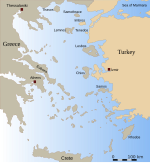| Revision as of 08:38, 6 June 2009 editSibadd (talk | contribs)Extended confirmed users2,228 edits →Greece's first green island: ~~~~← Previous edit | Revision as of 16:21, 17 June 2009 edit undo85.103.174.24 (talk)No edit summaryNext edit → | ||
| Line 22: | Line 22: | ||
| }} | }} | ||
| '''Agios Efstratios''' or '''Saint Eustratius''' ({{lang-el|Άγιος Ευστράτιος}}) is a small ] island in the northern ] about 30 km southwest of ] and 80 km northwest of ]. The three islands with nearby islets form the ] of ], part of the Greek archipelagic ] of the ]. | '''Agios Efstratios''' or '''Saint Eustratius''' ({{lang-el|Άγιος Ευστράτιος}}, {{lang-tr|Bozbaba}}<ref>{{cite web |url=http://tr.wikipedia.org/Bozbaba |title=Bozbaba}}</ref>)) is a small ] island in the northern ] about 30 km southwest of ] and 80 km northwest of ]. The three islands with nearby islets form the ] of ], part of the Greek archipelagic ] of the ]. | ||
| ==Name== | ==Name== | ||
Revision as of 16:21, 17 June 2009
Agios Efstratios or Saint Eustratius (Template:Lang-el, Template:Lang-tr)) is a small Greek island in the northern Aegean Sea about 30 km southwest of Lemnos and 80 km northwest of Lesbos. The three islands with nearby islets form the prefecture of Lesbos, part of the Greek archipelagic periphery of the North Aegean.
Name
The island was named after Saint Eustratius, who lived on the island in the ninth century as an exile, because he was opposed to the iconoclastic policies of the Byzantine Emperor Leo the Armenian. His supposed grave is still being shown by the inhabitants.
Geography
Agios Efstratios is quiet, isolated and dry, with a population of approximately 300 people. The climate is arid, with little rainfall during the winter months and long, hot summers. The landscape is mostly rocky, with scarce and low vegetation. Crops are insignificant; the surrounding sea, however, is rich in fish which are fished by local fishermen. There are numerous beaches on the island such as Agios Antonios, Lemonies, Avlakia and others, most of which are reached by caique. Agios Efstratios Island is linked by boat with Limnos, Agios Konstantinos, Kymi and Kavala.
Recent political history
The island was used to house political prisoners in internal exile during the 1930s. In 1968, an earthquake demolished most of the houses, which were replaced by concrete prefabricated buildings laid out in a military-like camp formation. Nonetheless, the island retains a very attractive capital, also called Agios Efstratios, while preserving a rather unspoiled Mediterranean environment with pristine beaches. It is mostly a place for relaxation and meditation. In the 1970s, the island was again used as an offshore prison for political dissidents. One of its most famous prisoners was Mikis Theodorakis, political activist and musical composer.
February 2007 NATO exercise
On February 26, 2007, Turkey for the first time objected to the scheduled NATO military exercise in the North Aegean sea, on the grounds that the island was a demilitarized zone. The exercise was organized by the Greek Combined Air Operations Centre (CAOC-7) for February, 27, commanded by Greek Air Force General based at Larissa. The day before, the commander of the Turkish Combined Air Operations Centre (CAOC-6) at Eskisehir notified the American NATO Air Force commander General Lee McFann that the island is considered demilitarized by Turkey and the exercise should be canceled. McFann canceled the exercise without further investigating even without notifying CAOC-7. He justified this by stating that NATO remains neutral when there is a disagreement between two member countries. The Greek Operation Centre also canceled the exercise due to bad weather conditions. After the incident became known, the Greek government formally complained to NATO.
Greece's first green island
Athens News Agency reporteded that, on 4 June 2009, at a two-day international conference in Athens on "Climate Change and Challenges for the Future Generations" under the patronage of UNESCO, Greece's Development Minister Kostis Hatzidakis said that Agios Efstratios would soon become the country's first "green" island, entirely powered by renewable energy sources (RES), its residents relying on solar and wind generated energy and moving around the island on bicycles and in electric cars. Hatzidakis said a €10 million project would be implemented by 2010. At the same conference Professor Philippos Tsalidis, Development Ministry General Secretary for Research and Technology, said that although Greece's energy needs currently required strategic reliance on natural gas, Aghios Efstratios, could serve as a global model for 100% reliance on RES. Agios Efstratios is included in the European Union's Natura 2000 network of nature protected areas.
References
External links
| Aegean Sea | |||||||||||||||||||
|---|---|---|---|---|---|---|---|---|---|---|---|---|---|---|---|---|---|---|---|
| |||||||||||||||||||
| |||||||||||||||||||
Template:Lesbos prefecture 39°31′N 25°00′E / 39.517°N 25.000°E / 39.517; 25.000
Categories: